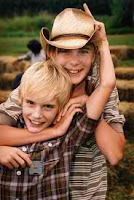Helping Non-Autistic Children Cope with Their Asperger’s or HFA Sibling
"What suggestions have you tried regarding helping the siblings of your autistic child to have more compassion. When they try to play with our autistic child, it always ends badly as he has to make up and enforce a set of rules for whatever game they are playing at the time - so we are in the position of having to keep them apart."
 As a mother or father, you want to give all your kids equal attention. But when parenting a youngster with Asperger’s (AS) or High Functioning Autism (HFA), that can be difficult. Your “special needs” youngster has more challenges and obstacles – and may take more of your time. As a result, your other children may begin to feel left out.
As a mother or father, you want to give all your kids equal attention. But when parenting a youngster with Asperger’s (AS) or High Functioning Autism (HFA), that can be difficult. Your “special needs” youngster has more challenges and obstacles – and may take more of your time. As a result, your other children may begin to feel left out.
In addition to feeling left out, siblings of an AS or HFA youngster may experience the following:
 As a mother or father, you want to give all your kids equal attention. But when parenting a youngster with Asperger’s (AS) or High Functioning Autism (HFA), that can be difficult. Your “special needs” youngster has more challenges and obstacles – and may take more of your time. As a result, your other children may begin to feel left out.
As a mother or father, you want to give all your kids equal attention. But when parenting a youngster with Asperger’s (AS) or High Functioning Autism (HFA), that can be difficult. Your “special needs” youngster has more challenges and obstacles – and may take more of your time. As a result, your other children may begin to feel left out.In addition to feeling left out, siblings of an AS or HFA youngster may experience the following:
- trying to make up for the deficits of their sibling
- frustration over not being able to engage – or relate to – their sibling
- embarrassment around friends
- concern regarding their parents’ anxiety
- concern over their role in future caretaking
- being the target of aggressive behaviors
Due to the nature of AS and HFA, it may be tough for your non-autistic children to form a satisfying relationship with the sibling who has the condition. For instance, their attempts to play with their sibling may be rejected, may turn into a fight due to his or her lack of play skills, or may end suddenly due to his or her meltdowns and tantrums.
The parent needs to understand what the non-autistic kids may be thinking and feeling. These kids love their AS or HFA sibling. They want to understand why there are some things that he or she can’t do, and how they can help. By honestly answering their questions in an age-appropriate way, the parent can clear up any confusion, help ease worries, and give the other children a chance to help out.
==> Parenting System that Significantly Reduces Defiant Behavior in Teens with Aspergers and High-Functioning Autism
How to help your non-autistic children cope with their AS or HFA sibling:
1. Preschoolers are self-centered by nature. Your non-autistic preschooler may feel that everything is about him and what he wants — from the toy he wants to play with to the game he asks for at the mall. As a result, helping him understand why his AS or HFA sibling needs more of your time and attention can be difficult. When possible, try to spend one-on-one time with your non-autistic youngster. Even a few minutes spent watching a cartoon or allowing him to help you cook a meal can provide the quality parent-child time that he needs.
2. When your children ask about their AS or HFA sibling's disorder, explain it using simple, honest descriptions they can understand. For example, if they ask why their brother only eats chicken nuggets and fruit, you can say something such as, "He has trouble eating certain foods because he has Asperger Syndrome." If they ask, "What is that?" …state in simple terms that it's a disorder that makes certain foods taste bad.
3. Younger children tend to have a wild imagination. So, the monster in the closet is very real, and the tea at the tea party is very hot. When children have a sibling with AS or HFA, their imagination might lead them to worry that their sibling’s disorder is contagious, like the flu. Reassure them that they can’t "catch" a disorder like Asperger’s, and that nothing they did caused their sibling to have this disorder – it is nobody’s "fault."
4. Don't let your children make you think that everything always has to be "fair" and "equal" — sometimes one kid needs more than the other, whether or not he/she has a disorder.
5. As your children start to better understand the "why" of their sibling’s diagnosis, you will probably get more complicated questions from them. For instance, for questions about their sibling’s meltdowns, your response may be: "He has trouble putting his feelings into words, so he throws things to express his feelings." Then, the next question may be, "Will he ever be able to tell us how he feels?" …to which you can answer honestly: "Yes he will, but we have to help him calm down and show him how to use words instead of acting-out. That's why he goes to his therapist.”
==> Parenting System that Significantly Reduces Defiant Behavior in Teens with Aspergers and High-Functioning Autism
6. Don't spend any time trying to figure out which youngster is to blame for a dispute. It takes two to argue — everyone involved is partly responsible. That includes your AS or HFA child.
7. If arguments between your AS or HFA child and his/her siblings are frequent, consider holding weekly family meetings in which you repeat the rules about fighting – and review past successes in reducing conflicts.
8. At some point, your children may try to explain their AS or HFA sibling's disorder to their peers. Some of their friends may ask rude questions, make inappropriate comments, or even engage in teasing and bullying. This, of course, can leave your AS or HFA youngster feeling ashamed, hurt, or angry. Parents can help their children cope with this situation by rehearsing some conversations. For example, “If one of your friends says ‘what's wrong with your brother?’ … you can say ‘he has autism’. If your friend says ‘what’s that?’ …then you can say ‘it’s something that makes my brother act differently than we do’.”
9. Consider establishing a program where all your children earn points toward a fun family-oriented activity when they work together to curtail arguing and fighting.
10. Sibling rivalry occurs in all families, but in those cases where one child has “special needs” – and therefore gets “special attention” – the incidents of sibling rivalry can be more frequent and more intense. Jealousy is common, and claims that “you love him more than me” abound. After all, they may see their AS or HFA sibling occasionally being allowed to stay up later, being excused from doing chores, getting extra help with homework, not being made to eat his vegetables, and so on. Comparisons are typical, but parents can explain to their non-autistic children that while it seems unfair, their AS or HFA sibling has to have this extra help due to his disorder. As an analogy, one parent stated, “If your brother was crippled and had to have a wheel chair to get around, would you complain that he has a wheel chair and you don’t?”
11. If your kids frequently quarrel over the same things (e.g., video games, the TV remote, etc.), post a schedule showing which youngster "owns" that item at what times during the day or week. If this doesn’t work and they keep arguing about it, take the item away altogether.
12. As your children become adolescents, you may find that you rely more on them to keep an eye on their AS or HFA sibling or to help around the house. As a result, they may feel increased pressure to care for their sibling, and may even become resentful. So, try not to ask too much of your non-autistic children. Make some responsibilities (e.g., helping with homework, babysitting, etc.) a choice. This will help them feel that they have control over how much assistance they provide. For instance, you might say, "It would be great if you could help your brother with his Math homework, but if you have other plans, that's fine."
==> Parenting System that Significantly Reduces Defiant Behavior in Teens with Aspergers and High-Functioning Autism
13. Make sure children have their own time and space to do their own thing (e.g., to enjoy activities without having to share, to play with friends without a sibling tagging along, to play with toys by themselves, etc.).
14. Remember, as children deal with sibling-conflict, they also learn important skills that will serve them well later in life (e.g., how to compromise and negotiate, how to control aggressive impulses, how to value another person's perspective, etc.). So in essence, some sibling conflict is actually a good thing.
15. In some families, the sibling rivalry between the non-autistic child and his or her “special needs” sibling is so severe that it disrupts daily functioning, or drastically affects one or both of them psychologically and emotionally. In this case, parents should seek the assistance of a mental health professional. Get outside help if the conflict is related to other significant concerns (e.g., anxiety, depression, etc.), is so severe that it's causing marital problems, is damaging to the psychological well-being or self-esteem of any family member, or creates a real danger of physical harm to any family member.
On a positive note, siblings of a youngster with AS or HFA often admit that there were many positive things that resulted from growing up with a “special needs” brother or sister. For example, they developed confidence when facing difficult challenges, learned how to handle difficult situations, and learned patience, tolerance and compassion. Research reveals that non-autistic children viewed their relationship with their AS or HFA sibling as positive when they experienced positive responses from parents and friends toward their sibling, had a good understanding of their sibling’s disorder, and had well-developed coping skills.
Moms and dads should support their non-autistic children to find ways in which they can relate to – and share an interest with – the AS or HFA youngster. By utilizing the suggestions listed above, all siblings can bond with one another and show affection by laughing and playing together.
More resources for parents of children and teens with High-Functioning Autism and Asperger's:
==> How To Prevent Meltdowns and Tantrums In Children With High-Functioning Autism and Asperger's
==> Parenting System that Significantly Reduces Defiant Behavior in Teens with Aspergers and High-Functioning Autism
==> Launching Adult Children with Asperger's and High-Functioning Autism: Guide for Parents Who Want to Promote Self-Reliance
==> Teaching Social Skills and Emotion Management to Children and Teens with Asperger's and High-Functioning Autism
==> Parenting Children and Teens with High-Functioning Autism: Comprehensive Handbook


